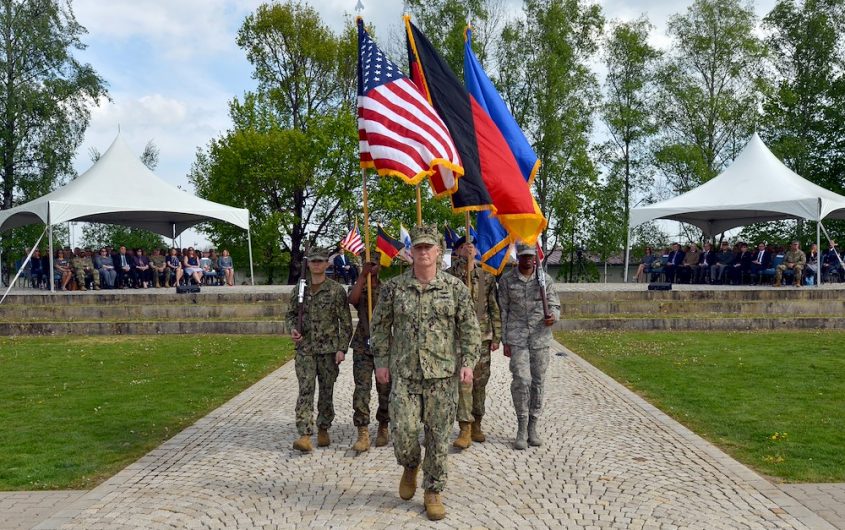
Ami Goes Home

Stephen F. Szabo
Senior Fellow
Dr. Stephen F. Szabo is a Senior Fellow at AICGS, where he focuses on German foreign and security policies and the new German role in Europe and beyond. Until June 1, he was the Executive Director of the Transatlantic Academy, a Washington, DC, based forum for research and dialogue between scholars, policy experts, and authors from both sides of the Atlantic. Prior to joining the German Marshall Fund in 2007, Dr. Szabo was Interim Dean and Associate Dean for Academic Affairs and taught European Studies at The Paul H. Nitze School of Advanced International Studies, Johns Hopkins University. He served as Professor of National Security Affairs at the National War College, National Defense University (1982-1990). He received his PhD in Political Science from Georgetown University and has been a fellow with the Alexander von Humboldt Stiftung, the Woodrow Wilson International Center for Scholars, and the American Academy in Berlin, as well as serving as Research Director at AICGS. In addition to SAIS, he has taught at the Hertie School of Governance, Georgetown University, George Washington University, and the University of Virginia. He has published widely on European and German politics and foreign policies, including. The Successor Generation: International Perspectives of Postwar Europeans, The Diplomacy of German Unification, Parting Ways: The Crisis in the German-American Relationship, and Germany, Russia and the Rise of Geo-Economics.
The announcement by Secretary of Defense Mark Esper confirming the removal of 12,000 U.S. troops from Germany marks the end of an era. Over 12 million American service personnel and their families have served in Germany since the end of World War II, forming an important link between the two countries. They were not seen as an occupying army, but rather as allies and neighbors. At one point over 250,000 American personnel were stationed in Germany, and yet relationships with the local population tended to be positive with very few real problems. This is remarkable given the experience of the presence of large numbers of foreign military in a country, like the American presence in Okinawa or even in South Korea, where 26,184 U.S. military personnel are concentrated in and around Seoul. When the troop withdrawal was announced, the mayor of Stuttgart, Fritz Kuhn, a Green, regretted it and noted the good relationship between the local population and the soldiers. Bavarian leader Markus Söder has also expressed his regrets over the reduction in the American presence in that state.
The reaction in Germany is likely to be one of resistance to further pressures from the Americans and resentment over the manner an old and key ally has been treated.
Although the Pentagon, like the German government, was not consulted by the White House on the initial decision announced in June, Secretary Esper tried to justify it on strategic concerns. It has been very clear, however, from the president’s statements that this is a vindictive measure aimed at Germany and Chancellor Angela Merkel out of frustration with the country’s level of defense spending and the Nord Stream 2 gas pipeline project with Russia. The memory of this unilateral American decision will not fade quickly among German political leaders. A Pew Research poll taken in March of this year found that only 15 percent of Germans see these bases as “very important” (compared to 56 percent of the American public). While localities where the troops are stationed will be hurt, overall the reaction in Germany is likely to be one of resistance to further pressures from the Americans and resentment over the manner an old and key ally has been treated.
Secretary Esper has tried to make lemonade out of lemons by announcing the transfer of the U.S. European Command from Stuttgart to Mons, Belgium (the Africa Command may move either to another European location or the United States). Co-locating EUCOM with NATO’s military headquarters in many respects makes sense and seems to be a rational choice, as both commands are led by the same U.S. General, and it will allow closer coordination between the two commands. However, a big question regards the decision to enhance the American troop presence in Poland. Despite heavy lobbying by Polish president Andrzej Duda, American troops will not be redeployed permanently to a Fort Trump in Poland, but the numbers rotating in and to a wide variety of locations will increase tensions within the alliance about violating the NATO-Russia Founding Act. The decision, according to National Security Advisor Robert O’Brien, is intended to show “resolve to deter Russian aggression.” It also seems to be driven by Trump’s need to be seen as tough on Russia given his weak responses to Russian moves and the role this will play in the upcoming U.S. elections. It will widen the German-American split given German concerns about strengthening ties with an illiberal government in Poland and increasing tensions with Russia.
No one should expect that the German-American relationship will continue unchanged after seventy-plus years, and certainly alterations in structures and relationships are in order.
The negative reactions from leading Republicans and the Biden team mean that some of this may be reversed if Biden wins the November elections, but the broader strategic relationship will continue to evolve and raise hard questions for both sides. No one should expect that the German-American relationship will continue unchanged after seventy-plus years, and certainly alterations in structures and relationships are in order. The Russian threat is hardly the same as it was during the Cold War, when 400,000 Soviet troops were stationed in East Germany. British and French forces have long since departed Germany, and it was apparent for a long time that American troops in Germany were deployed there for out of area missions and training across Europe with NATO allies rather than for the defense of Germany itself.
As with both the Trump and Obama administrations, a Biden administration would focus more on China, which has already become central to the German-American relationship. The public and many Democrats have argued for more balanced burden sharing with the Europeans, although not in the transactional manner of the past four years. American disengagement from the Middle East as part of the pivot to Asia will continue and will reduce the importance of Germany as a staging area for the Middle East and South Asia. The operational weakness of the German armed forces will remain an irritant given the insufficient resources that they have, something which, however, is now beginning to be addressed in Berlin. Major procurement decisions including the purchase of American F-18s as a successor to the Tornado fighter aircraft and the role of Germany in nuclear sharing will be influenced by German perceptions of the changing American role in Europe and in Germany. If the purpose of the troop reductions is to spur more defense spending by Germany, the reaction could be the opposite as there could be growing resistance to give in to what is seen as bullying by the United States and could spur efforts to build and buy European platforms.
While China looms large, Russia remains a real threat, even if it is not likely to initiate an all-out conflict. The Cold War was all about Germany, who controlled it and where it would end up in the European system. Germany remains central to the management of the Russia challenge, even if this is a different one from the Cold War. In short, the United States and Germany continue to need each other as partners and allies as they face this dual challenge. This unilateral, vindictive, and highly personal decision just makes this that much harder.
With thanks to Noah Ramsey for research assistance.









